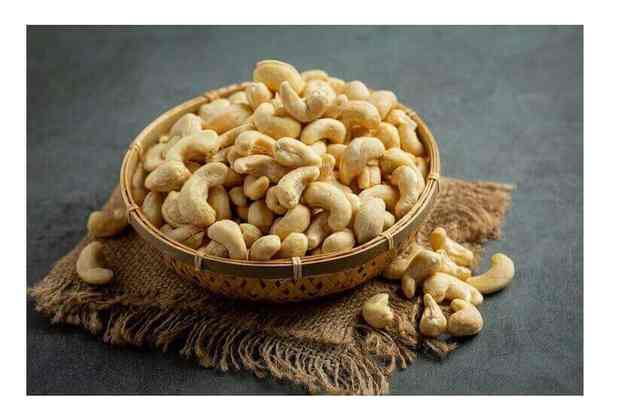Despite their name, cashew nuts are seeds. Because they’re made from cashews, they’re highly nutritious and beneficial to one’s health. Minerals such as phosphorus and selenium can be found in abundance. The beneficial antioxidants and fatty acids are responsible for most health benefits.
Raw and unprocessed cashews can be harmful, so avoid consuming them uncooked. Even after processing, the nutrients and flavour remain, and numerous health benefits exist. Cardiovascular health, weight loss, and cholesterol reduction have all been positively impacted by Cashew Nut consumption. All of the health benefits and nutritional value that cashews offer will be discussed in this post.
What are Cashew Nut?
Cashew trees are native to Brazil, but they are now grown in many countries around the world. Nuts aren’t what sprouts on the bottom of cashew apples, also known as cashew fruits; instead, they’re seeds. The kidney-shaped shells of cashew nuts/seeds are thickly layered with toxins, making them dangerous.
Shelling cashews mechanically damages the nuts, so they are primarily shelled by hand. W240 Cashew Nut can be pricey because of the time and effort required to prepare them by hand. Vitamin K, dietary fiber, omega-3 fatty acids, and other essential minerals abound in cashew nuts, making them suitable for your health.
Cashews are a good energy source and contain about 5 grams of protein per serving, which is about 10% of your daily quota. Minerals like copper, manganese, and magnesium set cashews apart from peanuts. Because they contain more omega-3 fatty acids and fewer omega-6 fatty acids than peanuts, cashews are preferred over peanuts as a snack food. A deficiency in these fatty acids can lead to inflammation and chronic disease.
The history and origins of cashew nuts
The word ‘cashew’ is derived from the Portuguese word ‘caju,’ which means ‘nut that grows on itself. Cashews were first grown in Brazil’s northeast, where they were transported by Portuguese ships to Mozambique and the Indian Ocean coast in the 16th century. Through India, cashews made their way to Southeast Asia and, eventually, to Africa. Cashews are cultivated on Anacardiumoccidentale trees when we talk about cashew breeding (the cashew tree). Currently, plantations in tropical climates are home to this tree. For example, it’s thriving in the Ivory Coast, Tanzania, and the Ivory Coast.
The cashew tree produces the nuts that we know as cashews
An AnacardiumOccidentale tree produces cashew apples with drupes at the end of the fruit. Twelve meters is the maximum height of the tree. The cashew tree grows directly on the apple tree, and the apple-shaped pseudo-fruit grows later. Consumption of vitamin C-rich apples is rare because of their acidic taste. Cashew apples, on the other hand, are considered delicacies in some parts of the world and are eaten to fight off various bacteria.
W320 Cashew Nut shells contain phenolic resin and salicylic acid, which can irritate the skin when they come into contact with it. For example, in Africa or Brazil, this occurs. Wood varnishes, for example, are manufactured using shells.
Cashew nuts and their health benefits
Cashews have been shown to lower the risk of heart disease
Cashews can lower the risk of heart disease, high cholesterol, high blood pressure, and obesity if consumed regularly. Nuts can also help with stress management, inflammation treatment, and vascular and arterial activity, which are essential for a healthy heart.
They are effective in the fight against high cholesterol
The “bad” LDL cholesterol can be lowered, and the “good” HDL cholesterol can be raised by eating cashew nuts. Phytosterol compounds in nuts help keep cells stable and prevent cholesterol from being absorbed.
They prevent gallstones from forming
The risk of gallstones in the gallbladder can be reduced by eating nuts, including cashews. The disease is caused by a build-up of cholesterol in the bile, which travels through the digestive tract and causes illness. If you have liver disease, the risk of gallstones is even more significant because the cholesterol released acts as an adhesive for other substances (such as calcium) to bind to the gallbladder.
Despite their high-fat content, they are practical tools for weight loss
For example, W180 Cashew Nut has a high-fat content of almost 46%. (Chart 1). Including them in your diet is a good idea because they’re packed with nutrients that help you lose weight. Cashews will fill you up and help you forget about overeating and snacking on unhealthy foods after eating them. Food fats make us feel fuller and help us absorb fat-soluble vitamins and minerals (for example, vitamins A and D). According to scientific research, people who eat nuts at least twice a week have a lower risk of gaining weight than those who don’t eat nuts at all.
Famous Gujarati Cashew Nut Manufacturers
Cashew nut wholesaler R.K. Agro Processing is well-known Cashew Nut suppliers in India for its low prices. R.K. Agro Processing is the place to go if you want to buy the best cashew nuts at the best prices. Organic nuts that are safe, healthy, and ideal for your diet are available from us. Get the best Organic Cashew Nut in India from the best Cashew Nut manufacturers in India.
Kaju Wholesale prices in Gujrat are much higher than the prices we charge for our nuts. Cashew nuts from R.K. Agro Processing will make your kitchen the happiest place in the house. Our policies are customer-friendly, and our home delivery services are hassle-free. For the finest cashews, get in touch with us right away.
FAQs
->What is Cashew Nut?
The cashew grows a boxing glove-shaped nut at the end of the apple.
->Do cashew Nut make you fat?
Dietary fat is abundant in cashews. According to the nutritional information, they contain 12.4 grams of fat per serving. Obtained from oleic acid, which accounts for more than half of the fat in this serving (6.7 grams).
->How nutritious are cashews?
Cashews are an excellent source of several essential nutrients, making them an ideal “snack” food.
Find out more: How cashew nuts are most in demand dry fruits


